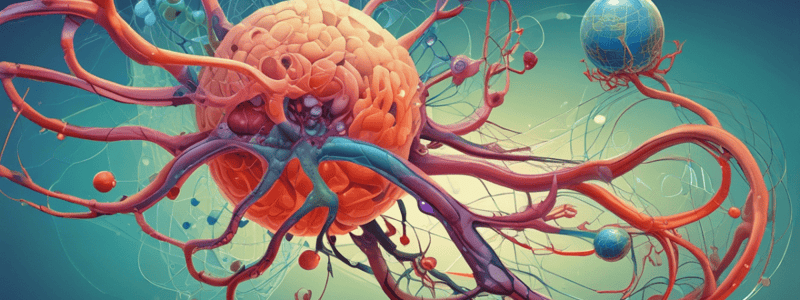Podcast
Questions and Answers
What is the main focus of the field of microbiology?
What is the main focus of the field of microbiology?
- The study of the relationships between organisms and their environment
- The study of plants and their interactions with the environment
- The study of heredity, genes, and genetic variation
- The study of microorganisms such as bacteria, viruses, and fungi (correct)
What is the process by which cells generate energy from glucose?
What is the process by which cells generate energy from glucose?
- Transcription
- Respiration (correct)
- Photosynthesis
- Mitosis
What is the sequence of nucleotides that determines the amino acid sequence of proteins?
What is the sequence of nucleotides that determines the amino acid sequence of proteins?
- Mitochondria
- Genetic code (correct)
- DNA structure
- Gene expression
What is the process of creating RNA from DNA?
What is the process of creating RNA from DNA?
What is the term for the grouping of organisms based on shared characteristics?
What is the term for the grouping of organisms based on shared characteristics?
What is the term for the use of biological systems, living organisms, or derivatives to make products?
What is the term for the use of biological systems, living organisms, or derivatives to make products?
Flashcards are hidden until you start studying
Study Notes
Branches of Biology
- Botany: study of plants and their interactions with the environment
- Zoology: study of animals and their interactions with the environment
- Microbiology: study of microorganisms such as bacteria, viruses, and fungi
- Ecology: study of the relationships between organisms and their environment
- Genetics: study of heredity, genes, and genetic variation
- Biochemistry: study of the chemical processes that occur within living organisms
Cell Biology
- Cell Structure:
- Cell membrane: semi-permeable membrane that surrounds the cell
- Cytoplasm: jelly-like substance inside the cell membrane
- Nucleus: contains genetic material (DNA)
- Mitochondria: generates energy for the cell
- Ribosomes: site of protein synthesis
- Cellular Processes:
- Photosynthesis: process by which plants convert light energy into chemical energy
- Respiration: process by which cells generate energy from glucose
- Mitosis: process of cell division
Molecular Biology
- DNA Structure:
- Double helix model: two strands of nucleotides twisted together
- Nucleotides: building blocks of DNA (A, C, G, T)
- Gene Expression:
- Transcription: process of creating RNA from DNA
- Translation: process of creating protein from RNA
- Genetic Code:
- Sequence of nucleotides determines amino acid sequence of proteins
Evolution and Diversity
- Evolution:
- Change in species over time through natural selection and genetic drift
- Fossil record: provides evidence of evolutionary history
- Species Diversity:
- estimated 8.7 million species on Earth
- Classification: grouping of organisms based on shared characteristics
Ecosystems and Ecology
- Ecosystem Components:
- Producers: organisms that make their own food (plants, algae)
- Consumers: organisms that obtain energy by consuming other organisms
- Decomposers: organisms that break down dead organic matter
- Energy Flow:
- Energy is transferred from one trophic level to the next through food chains
- Energy is lost as heat at each trophic level
Biotechnology and Applications
- Biotechnology:
- Use of biological systems, living organisms, or derivatives to make products
- Examples: genetic engineering, vaccines, antibiotics
- Medical Applications:
- Diagnosis and treatment of diseases using biological principles
- Examples: gene therapy, cancer treatment, organ transplantation
Studying That Suits You
Use AI to generate personalized quizzes and flashcards to suit your learning preferences.



